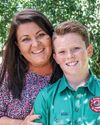
When my little girl caught COVID, she was struck down with a curious symptom: exhausted as she was, she couldn’t lie down because it made the room spin like the Luna Park Rotor (without the giddy delight of a thrill ride, just with the pesky nausea). We took turns to sit up with her, night after night, plumping her pillows so she could stay fully upright and offering everything from chamomile tea to foot massages and soothing sleep meditation apps to at least try to help ease her angst that the persistent spinning meant she would be sucked into some kind of other-worldly vortex at any given moment. More than three months later, her circadian rhythm hasn’t recovered and debilitating fatigue and dizzy spells occur at random, unofficially making her one of the estimated 400,000 Australians (and counting) who meet the current clinical criteria for Long COVID.
In 2020, the World Health Organisation formally recognised Long COVID which, under its definition, requires symptoms to last for more than two months and continue to linger more than three months after a confirmed COVID infection. The data varies wildly – between 5 and 54 per cent of COVID patients, depending on the study, have lingering symptoms, of which there are more than 100. The most common include fatigue (especially after activity), shortness of breath (in which, curiously, the lungs can appear normal in tests but sufferers are left feeling totally oxygen-drained), brain fog (making simple tasks difficult), sleep problems, chronic cough, muscle aches, loss of smell or taste, headaches, depression and anxiety.
This story is from the November 2022 edition of The Australian Women's Weekly.
Start your 7-day Magzter GOLD free trial to access thousands of curated premium stories, and 9,000+ magazines and newspapers.
Already a subscriber ? Sign In
This story is from the November 2022 edition of The Australian Women's Weekly.
Start your 7-day Magzter GOLD free trial to access thousands of curated premium stories, and 9,000+ magazines and newspapers.
Already a subscriber? Sign In

Maggie's kitchen
Maggie Beer's delicious veg patties - perfect for lunch, dinner or a snack - plus a simple nostalgic pudding with fresh passionfruit.

Reclaim your brain
Attention span short? Thoughts foggy? Memory full of gaps? Brigid Moss investigates the latest ways to sharpen your thinking.

The girls from Oz
Melbourne music teacher Judith Curphey challenged the patriarchy when she started Australia's first all-girls choir. Forty years later that bold vision has 6500 members, life-changing programs and a new branch of the sisterhood in Singapore.

One kid can change the world
In 2018, 10-year-old Jack Berne started A Fiver for a Farmer to raise funds for drought relief. He and mum Prue share what happened next.

AFTER THE WAVE
Twenty years ago, the Boxing Day tsunami tore across the Indian Ocean, shredding towns, villages and holiday resorts, and killing hundreds of thousands of people from Indonesia to Africa. Three Australians share their memories of terror, loss and survival with The Weekly.

PATRICIA KARVELAS How childhood tragedy shaped me
Patricia Karvelas hustled hard to chase her dreams, but it wasn't easy. In a deeply personal interview, the ABC host talks about family loss, finding love, battles fought and motherhood.

Ripe for the picking
Buy a kilo or two of fresh Australian apricots because they're at their peak sweetness now and take inspiration from our lush recipe ideas that showcase this divine stone fruit.

Your stars for 2025
The Weekly’s astrologer, Lilith Rocha, reveals what’s in store for your astrological sign in 2025. For your monthly horoscope, turn to page 192.

MEL SCHILLING Cancer made me look at myself differently'
One year on from going public with her bowel cancer diagnosis, Mel Schilling reveals where she's at with her health journey and how it's changed her irrevocably.

Nothing like this Dame Judi
A few weeks before her 90th birthday, the acting legend jumped on a phone call with The Weekly to talk about her extraordinary life – and what’s still to come.